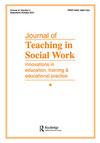社会工作教育中自我关怀的心身灵框架
IF 0.9
Q3 EDUCATION & EDUCATIONAL RESEARCH
引用次数: 0
摘要
摘要尽管社会工作领域中同情压力的比例很高,并且越来越多的人认识到自我照顾对道德社会工作实践和从业者的整体福祉至关重要,但社会工作教育尚未充分回应学生和新专业人员的自我照顾和健康需求,也没有为他们做好充分准备面对社会工作实践的压力现实。自我照顾教育对学生/从业者的成功至关重要,需要创新的计划和课程开发。它也需要更多的讨论和解释概念框架,在此基础上,自我保健教育将被设计和实施。鉴于自我保健涉及个体独特的生物心理社会需求,以及他们偏好的治疗方法和文化信仰,本文呼吁建立一个心理-身体-精神框架的自我保健教育。对这种框架的必要性进行了审查,并提出和讨论了一个示例课程。关键词:压力-倦怠教学与学习学术价值与伦理披露声明作者未报告潜在的利益冲突。其他信息资金作者报告没有与本文所述工作相关的资金本文章由计算机程序翻译,如有差异,请以英文原文为准。
A Mind-Body-Spirit Framework for Addressing Self-Care in Social Work Education
ABSTRACTDespite high rates of compassion stress within the field of social work and the growing acknowledgment that self-care is critically important to ethical social work practice and to the practitioner’s overall well-being, social work education has not yet adequately responded to the self-care and wellness needs of students and new professionals, nor has it fully prepared them for the stressful realities of social work practice. Self-care education is essential for student/practitioner success and necessitates innovative programmatic and curricular development. It also entails more discussion and explication of conceptual frameworks upon which self-care education will be designed and implemented. Given that self-care relates to individuals’ unique biopsychosocial needs, as well as their preferred methods of healing and cultural beliefs, this paper calls for a mind-body-spirit framework for self-care education. The need for such a framework is examined and a sample curriculum is presented and discussed.KEYWORDS: Stress-burnoutscholarship of teaching and learningvalues and ethics Disclosure statementNo potential conflict of interest was reported by the author(s).Additional informationFundingThe author(s) reported there is no funding associated with the work featured in this article
求助全文
通过发布文献求助,成功后即可免费获取论文全文。
去求助
来源期刊

Journal of Teaching in Social Work
EDUCATION & EDUCATIONAL RESEARCH-
CiteScore
1.20
自引率
0.00%
发文量
36
期刊介绍:
The Journal of Teaching in Social Work fills a long-standing gap in the social work literature by providing opportunities for creative and able teachers—in schools, agency-based training programs, and direct practice—to share with their colleagues what experience and systematic study has taught them about successful teaching. Through articles focusing on the teacher, the teaching process, and new contexts of teaching, the journal is an essential forum for teaching and learning processes and the factors affecting their quality. The journal recognizes that all social work practitioners who wish to teach (whatever their specialty) should know the philosophies of teaching and learning as well as educational methods and techniques.
 求助内容:
求助内容: 应助结果提醒方式:
应助结果提醒方式:


